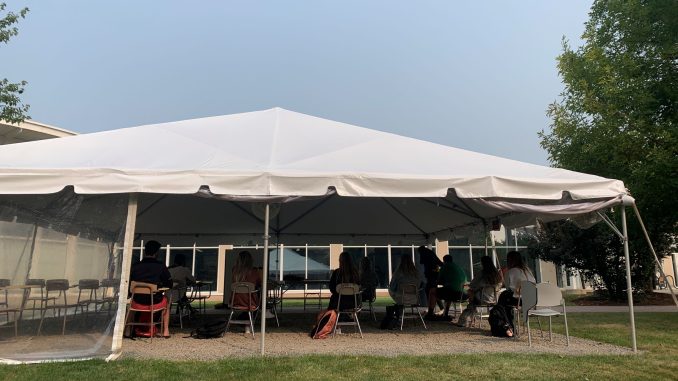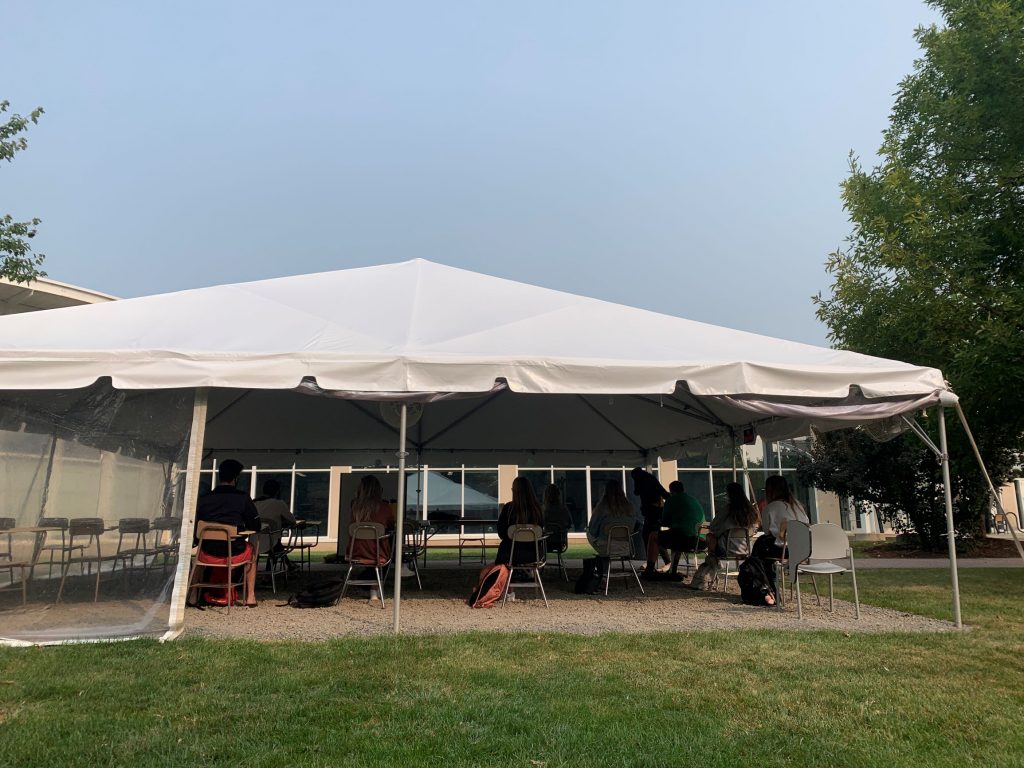
Claude Wolfer
clwolfer@ursinus.edu

In a letter addressed to the Ursinus Class of 2024, the Common Intellectual Experience (CIE) co-coordinators introduced new students to their first college course: “Welcome to the Common Intellectual Experience. In just a few weeks, you will take one of the boldest steps of anyone in your generation: you will be among the first college students anywhere to walk into a classroom since a global pandemic shut down education as we know it.”
Among this letter’s signatories was Dr. Abby Kluchin, Professor of Philosophy and Religious Studies and the Pedagogy Coordinator for CIE. Dr. Kluchin was instrumental in designing this semester’s CIE block, particularly in the implementation of a new S/U (Satisfactory/ Unsatisfactory) grading system. She explains that the pedagogical motive behind this new evaluative process was “to lower student anxiety (especially given the challenges of this unusual year) and to create learning conditions that would genuinely increase risk-taking both in class discussions and in student writing.”
Traditionally, CIE100 extends through the Fall Semester and meets twice or thrice a week, serving as the foundation for first-year and transfer students’ academic journeys at Ursinus. Students ordinarily receive a letter grade at the end of the semester, just as they do in most other Ursinus courses. Amid the pandemic, however, the CIE Coordinators redesigned the course to occupy a two-and-a-half week timeframe, allowing for a phased move-in wherein upperclassmen would arrive on campus after CIE classes had concluded. This drastic compression of the curriculum demanded a serious pedagogical re-working. Although she didn’t teach CIE this semester, Dr. Kluchin had a unique perspective of the class from her position as Co-Director of the Teaching and Learning Institute. “With grades off the table and with no other classes, our new students were able to seek their own points of entry into the CIE texts and questions, and to enter more fully into the co-creation of an intellectual community,” she observed.
Diane Skorina, librarian and Director of Research and Teaching & Learning Services, for LIT; and Dr. Kluchin’s counterpart as Co-Director of the Teaching and Learning Institute, taught CIE again this semester after a few years’ hiatus. This semester’s structure, of course, was as new to Professor Skorina as it was to everyone else, but she thought it went well nevertheless. In comparing the CIE block to its semester-long predecessor, Professor Skorina says: “If you look at the learning goals of CIE, they are not about content. They are about becoming closer readers, learning discussion … and I do think what happens is, when it’s part of the ‘regular’ semester, it’s just a little bit out of context, because all of their other courses are very heavily content-focused. Especially the intro-level courses that most first-years are taking.” She continues, “I’ve found that as the semester goes on, it’s harder to keep [students] engaged in what we’re doing in the classroom. Whereas, in this concentrated, two-anda-half week, three hours per day [format]… that’s all they were doing. They didn’t even have sports competing with it.” Professor Skorina held her on-campus CIE classes on the second floor of the library and was impressed with students’ dedication to the intensive version of the course, free of the usual pressures and distractions of taking additional courses.
Dr. Talia Argondezzi, Director of the Center for Writing and Speaking, taught a section of the CIE block in an outdoor tent on campus while simultaneously facilitating the pairing of Writing Fellows with CIE students as they worked on their first college papers. During ordinary semesters, Dr. Argondezzi also assists other professors in teaching writing in CIE, holding writing workshops throughout the semester and pairing Writing Fellows with class sections. Teaching college-level writing to first-year and transfer students whose previous experience with formal essay-writing is so widely varied is no simple task under ordinary conditions, but during such a condensed and shortened timeline, the challenge loomed even larger. As Dr. Argondezzi recounts: “Going into the semester, I was very worried about teaching writing because one of my thoughts about writing improvement for the writer is that it takes some time. So, I was concerned that… even if the students worked really hard and managed their time perfectly, they [still] have … a limited amount of days to let their ideas percolate and simmer, and just to contemplate before writing [their papers].” Despite her initial uncertainty, Dr. Argondezzi found that she was “actually very surprised that I thought students were able to improve a lot over the two and a half weeks, and… I actually think the compression might have intensified improvement a little bit because there is nothing else going on.” Dr. Argondezzi went on to express observations similar to Professor Skorina’s: Despite the short timeframe of CIE, the opportunity for students to focus solely on this course encouraged diligent studying, lively discussion, and thoughtful writing.
Through working with CIE students as a Writing Fellow, my experience echoes what each professor I interviewed said — I was thoroughly impressed at the depth with which students reflected on the texts and class discussions and synthesized their thoughts into essays, all in such a short amount of time. As with other inventive educational practices that have emerged out of unforeseen desperation during the pandemic, the success of this semester’s CIE block is a testament to the value of creativity. Dr. Kluchin articulates this sentiment elegantly: “I don’t want to traffic in the appalling rhetoric of treating an objectively awful situation as an ‘opportunity.’ But it’s been downright inspiring to see how our faculty — many of whom spent the summer learning as much as possible about new teaching technologies and pedagogical strategies for the age of COVID-19 — not only rose to the occasion, but are experimenting in some really exciting and unforeseeable ways with their pedagogy as a result of the challenges that 2020 has thrown at all of us.”
This uncommon educational opportunity afforded the Class of 2024 and this semester’s transfer students a profound sense of commonality as they shared their first few weeks at Ursinus in collective intellectual collaboration that extended even beyond the classroom. Perhaps the “Common” in Common Intellectual Experience was never intended to denote normalcy or uniformity, but rather community.
